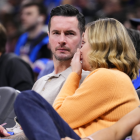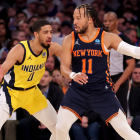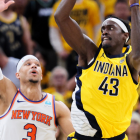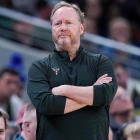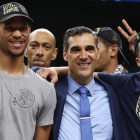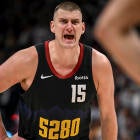OKLAHOMA CITY -- David Stern ridiculed lottery-fixing conspiracy theories, called some NCAA colleges "vocational schools" for the NBA and predicted 10 years of labor peace in an interview with CBS Sports launching Tuesday in the hours before Game 1 of the NBA Finals.
In a conversation with Ian Eagle, Stern also once again defended his handling of the Chris Paul trade and anointed deputy commissioner Adam Silver as his successor -- but did not commit to a timetable for his eventual retirement. Stern has been commissioner of the NBA for 28 years.
"I realize I'm one of those people that's always hurtling through and looking to the next day and not doing a lot of assessing of what's gone on in the past," Stern said.
But Stern was not only in a mood to assess the past, he also went about predicting the future -- at one point, breaking one of his own mantras in saying his "crystal ball" tells him that neither the owners nor players will opt out of the new collective bargaining agreement after six years. Lockout enthusiasts will recall Stern's frequent proclamations during the work stoppage that he did not have a crystal ball. Now he does.
| 2012 NBA Finals Coverage |
| Related links |
|
"Things are going to be going so well for the players and the owners that this is a 10-year deal," Stern said. "… The stability that is going to come from a deal of this duration is very important."
Stern, 69, has already stated publicly that he will no longer be commissioner when both sides can opt out of the labor agreement in 2017. And he once again threw his considerable weight behind his longtime right-hand man, Silver, to deal with all the challenges and controversies that have marked his own more than quarter-century reign.
"I figured I’d find someone who the owners actually like to speak to rather than me, so that’s No. 1," Stern said. "They all like him and like to speak to him. And his attributes are he is a first-class businessman. He has excellent relationships and an understanding of our broadcast business, our marketing partnership business, our licensing business, our digital business; he’s the architect of much of it. Everyone reports to him on international. Basically, I'm giving away the secret that I don’t do anything."
In fairness, as Stern likes to say, he's done plenty. Not the least of which was presiding over bargaining talks that narrowly avoided a canceled season that would've made the anticipated matchup between the Heat and Thunder impossible. Game 1 of the Finals is Tuesday night in Oklahoma City, and Stern took a moment to relish in his owners' vision that OKC won't be the last small-market team to get to this point.
"I think we’re working hard to eradicate the small-market designation," Stern said. "When Green Bay is in the Super Bowl with Pittsburgh or Indianapolis, nobody says, 'Oh my, a small-market team,' because the rules that they have allow everyone to compete. And that’s what we now have under our new collective bargaining agreement. It’s not about the market size. It’s not about the money. It’s about the management. ... Each of our teams has been put together in a different way under our rules."
Of course, the Heat, Thunder and the other 28 teams were put together primarily under the old rules that the owners sought to tear down. The true effects of the CBA -- shorter contracts, a more punitive luxury tax and a revamped revenue-sharing plan -- won't begin to kick in until after the Finals, during the first full-fledged free-agent period under the new labor deal.
"It was a challenging time," Stern said of the lockout. "But I have this view that there’s this ship called the S.S. NBA, and I’m supposed to be the captain. That’s my job. And so we’ll occasionally go through rough waters, but we’re going to get through it because at the bottom or at the center of it all is basketball."
Stern's strongest moment during the interview, launching at noon ET Tuesday as part of the Conversations with CBS Sports series, came when he explained the air-tight procedures by which the draft lottery is conducted and poked fun at those who perennially allege that it's fixed. The New Orleans Hornets, still technically owned by the league until the Board of Governors approves the purchase agreement by Saints owner Tom Benson, were awarded the No. 1 pick and thus the rights to Kentucky's Anthony Davis.
"I think we have the loot from the Brinks Robbery and the Great Train Robbery, as well," Stern said. "I don’t know which floor we keep it on because we move it around. But it has gotten enough sort of annual currency that the one thing we want to do is -- even though we shrug it off and make a little fun of it -- we also make sure that our process is about as airtight as it could possibly be and well reviewed and viewed, so there’s no problem."
Other highlights from Stern's interview:
* On the rule requiring players to be 19 and one year removed from high school to be draft-eligible, which Stern has publicly stated he would like to increase: "I believe that 19 is better than 18. We understand that players who are anxious to get to the league use the college as a training ground -- really, sort of a vocational school. I'm not sure that it’s a better training ground than our NBA Development League or a better training ground than Brandon Jennings found in the Euro League. But that’s the player’s choice -- and the school’s choice, I might add. The school can choose to become a vocational tool for the players, and some do."
* On the league's role in taking ownership responsibility for the Hornets: "To me, the only chance of preserving that team for New Orleans was league ownership. So I didn’t think there were choices and the owners unanimously agreed with me on that."
* On his role as the Hornets' ownership representative in refusing to approve a trade sending Paul to the Lakers and instead approving a deal that sent him to the Clippers: "No one trades a future Hall of Famer because a GM says, 'Oh, I think we should do it.' Are you kidding? I said, 'Either we’re in or we’re out,' and I said, 'We’ll speak up when we make the next trade, which we think will be better for the long term prospects of the franchise.' And it was. Did I enjoy it? No. Would I do it again? Not unless I had to."















